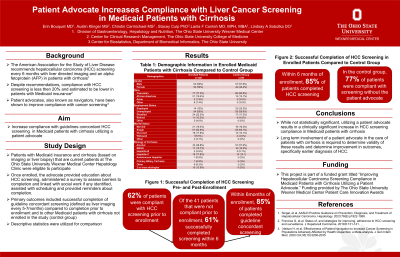Tuesday Poster Session
Category: Liver
P4609 - Patient Advocates Increase Compliance with Hepatocellular Carcinoma Screening in Medicaid Patients with Cirrhosis
Tuesday, October 29, 2024
10:30 AM - 4:00 PM ET
Location: Exhibit Hall E

Has Audio
- LS
Lindsay Sobotka, DO
The Ohio State University Wexner Medical Center
Columbus, OH
Presenting Author(s)
Award: Presidential Poster Award
Erin Bouquet, MD1, Austin Klingler, MS2, Christin Carmichael, MS1, Stacey Culp, PhD3, Lanla Conteh, MD, MPH, MBA1, Lindsay Sobotka, DO1
1The Ohio State University Wexner Medical Center, Columbus, OH; 2The Ohio State Wexner Medical Center, Columbus, OH; 3Ohio State University, Columbus, OH
Introduction: Patients with cirrhosis are recommended to complete hepatocellular carcinoma screening every 6 months to improve recognition of malignancy at early stages potentially allowing for curative treatment. Unfortunately, most patients with cirrhosis are unsuccessful in following timely screening exam with Medicaid patients being the least compliant. As a result, Medicaid patients with cirrhosis are typically diagnosed with hepatocellular carcinoma at advanced stages and are only candidates for palliative treatment. This study aims to increase guideline concordant screening in Medicaid patients with cirrhosis.
Methods: Established Medicaid patients with cirrhosis treated at The Ohio State Wexner Medical Center who were deemed eligible for hepatocellular carcinoma screening were eligible to enroll. Once enrolled, a patient advocate provided education about hepatocellular carcinoma screening, administered a survey to address barriers, linked to a social worker if needed, assisted with scheduling and provided reminders about completion. Primary outcome was completion of appropriately timed hepatocellular carcinoma defined as 5-7 months from their last screening exam. Screening compliance was compared to Medicaid patients with cirrhosis that did not utilize an advocate. Descriptive statistics were utilized for comparison.
Results: Of the total 127 patients who have been enrolled in this study, 108 patients were included in this analysis given enrollment for at least 6 months. Most of the patients were Caucasian (77%) with alcohol as the etiology of liver disease (40%) and had a mean social vulnerability index of 0.5. An equal number of women and women were enrolled. The most common barriers to completion of screening were transportation (36.1%), scheduling constraints (34.3%), and concerns about cost or insurance coverage (32%). Prior to enrollment in the study, 62% (67/108 patients) were compliant with hepatocellular carcinoma screening. Once enrolled, compliance increased 85.2% (92/108 patients) compared to 77% (76/99) in the control group (p=0.121). Of the compliant patients enrolled in the study, 5 were found to have indeterminate liver lesions requiring further evaluation.
Discussion: Utilizing a patient advocate results in a clinically significant increase in hepatocellular carcinoma screening in Medicaid patients with cirrhosis.
Disclosures:
Erin Bouquet, MD1, Austin Klingler, MS2, Christin Carmichael, MS1, Stacey Culp, PhD3, Lanla Conteh, MD, MPH, MBA1, Lindsay Sobotka, DO1. P4609 - Patient Advocates Increase Compliance with Hepatocellular Carcinoma Screening in Medicaid Patients with Cirrhosis, ACG 2024 Annual Scientific Meeting Abstracts. Philadelphia, PA: American College of Gastroenterology.
Erin Bouquet, MD1, Austin Klingler, MS2, Christin Carmichael, MS1, Stacey Culp, PhD3, Lanla Conteh, MD, MPH, MBA1, Lindsay Sobotka, DO1
1The Ohio State University Wexner Medical Center, Columbus, OH; 2The Ohio State Wexner Medical Center, Columbus, OH; 3Ohio State University, Columbus, OH
Introduction: Patients with cirrhosis are recommended to complete hepatocellular carcinoma screening every 6 months to improve recognition of malignancy at early stages potentially allowing for curative treatment. Unfortunately, most patients with cirrhosis are unsuccessful in following timely screening exam with Medicaid patients being the least compliant. As a result, Medicaid patients with cirrhosis are typically diagnosed with hepatocellular carcinoma at advanced stages and are only candidates for palliative treatment. This study aims to increase guideline concordant screening in Medicaid patients with cirrhosis.
Methods: Established Medicaid patients with cirrhosis treated at The Ohio State Wexner Medical Center who were deemed eligible for hepatocellular carcinoma screening were eligible to enroll. Once enrolled, a patient advocate provided education about hepatocellular carcinoma screening, administered a survey to address barriers, linked to a social worker if needed, assisted with scheduling and provided reminders about completion. Primary outcome was completion of appropriately timed hepatocellular carcinoma defined as 5-7 months from their last screening exam. Screening compliance was compared to Medicaid patients with cirrhosis that did not utilize an advocate. Descriptive statistics were utilized for comparison.
Results: Of the total 127 patients who have been enrolled in this study, 108 patients were included in this analysis given enrollment for at least 6 months. Most of the patients were Caucasian (77%) with alcohol as the etiology of liver disease (40%) and had a mean social vulnerability index of 0.5. An equal number of women and women were enrolled. The most common barriers to completion of screening were transportation (36.1%), scheduling constraints (34.3%), and concerns about cost or insurance coverage (32%). Prior to enrollment in the study, 62% (67/108 patients) were compliant with hepatocellular carcinoma screening. Once enrolled, compliance increased 85.2% (92/108 patients) compared to 77% (76/99) in the control group (p=0.121). Of the compliant patients enrolled in the study, 5 were found to have indeterminate liver lesions requiring further evaluation.
Discussion: Utilizing a patient advocate results in a clinically significant increase in hepatocellular carcinoma screening in Medicaid patients with cirrhosis.
Disclosures:
Erin Bouquet indicated no relevant financial relationships.
Austin Klingler indicated no relevant financial relationships.
Christin Carmichael indicated no relevant financial relationships.
Stacey Culp indicated no relevant financial relationships.
Lanla Conteh indicated no relevant financial relationships.
Lindsay Sobotka indicated no relevant financial relationships.
Erin Bouquet, MD1, Austin Klingler, MS2, Christin Carmichael, MS1, Stacey Culp, PhD3, Lanla Conteh, MD, MPH, MBA1, Lindsay Sobotka, DO1. P4609 - Patient Advocates Increase Compliance with Hepatocellular Carcinoma Screening in Medicaid Patients with Cirrhosis, ACG 2024 Annual Scientific Meeting Abstracts. Philadelphia, PA: American College of Gastroenterology.


